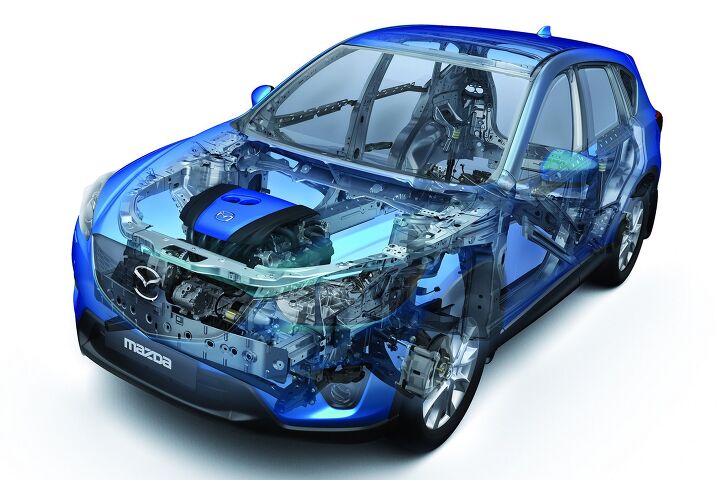Diesel Beginning To Spread

In Europe, half of the cars sold are diesels. In The U.S. and especially in Japan, automakers literally wrinkled their nose at oilburning cars. This is slowly changing, says The Nikkei [sub].
In India, a market owned nearly 50 percent by Suzuki, gas prices have soared 36 percent over the past year and a half, while diesel prices have increased by a more modest 14 percent.
Diesel-less Suzuki was blindsided by a wholesale shift to diesel. It dragged down Suzuki’s sales from April 2011 through February 2012 by 13 percent on the year. Mahindra & Mahindra has diesel and saw its sales jump by 36 percent. Suzuki did react by buying diesel engines from Fiat, much to the chagrin of Volkswagen.
Honda has developed a new diesel engine for the first time in six years. It plans to use it in Civics produced at Honda’s plant in Wiltshire, England.
Toyota forged an alliance with BMW to supply mid-sized diesel engines that will go into Toyota’s European offerings.
In the U.S., diesel market share is below 3 percent, in Japan, the share is below one percent. The Nikkei sees “signs that diesel cars are even appealing to consumers in Japan.”
In its first month of sales in February, Mazda received about 8,000 orders for its new CX-5 sport-utility vehicle, with diesel models accounting for 73 percent.

Bertel Schmitt comes back to journalism after taking a 35 year break in advertising and marketing. He ran and owned advertising agencies in Duesseldorf, Germany, and New York City. Volkswagen A.G. was Bertel's most important corporate account. Schmitt's advertising and marketing career touched many corners of the industry with a special focus on automotive products and services. Since 2004, he lives in Japan and China with his wife <a href="http://www.tomokoandbertel.com"> Tomoko </a>. Bertel Schmitt is a founding board member of the <a href="http://www.offshoresuperseries.com"> Offshore Super Series </a>, an American offshore powerboat racing organization. He is co-owner of the racing team Typhoon.
More by Bertel Schmitt
Latest Car Reviews
Read moreLatest Product Reviews
Read moreRecent Comments
- MaintenanceCosts I already set out total costs, so this time I'll list what's had to be done on my cars (not counting oil changes, recall, or free services):2019 Bolt (25k mi): new 12v battery, pending tires & battery cooling service2016 Highlander (from 43k to 69k mi): new front rotors, new pads all around, new PCV valve, 2x 12v batteries, light bulbs, pending tires2011 335i (from 89k to 91k): new valve cover gasket, new spark plugs, light bulbs, pending rear main seal1995 Legend (from 185k to 203k): timing belt/water pump, new EGR valve + pipe, struts, strut bushings, drive axles, tie rods, rear control arms, other suspension bushings, coolant hose & brake lines throughout, belts, radiator, valve cover gaskets, new power antenna, 12v battery, coils, spark plugs, tires, rear pads... it's an old car!
- VoGhost Consistent with CR's data. I've spent about $150 total on the Model 3 in six years of ownership, outside of tires.
- VoGhost It's just plain sad that Posky doesn't know that EV batteries are warrantied for 8 years / 100K miles.
- Jkross22 It used to be depreciation was the most expensive part of car ownership. Seems like those days are over (New EVs and lux cars excluded). Maintenance + insurance have taken over. Dealerships offering 2 years of maintenance means nothing. That's $200 tops. It's the unexpected repairs - a wiring harness, computer module, heater core, AWD problems - that will cost dearly. Brakes can be expensive since many cars now can't have rotors resurfaced. Even independents are charging a lot for this work.
- FreedMike VW tossed in two years' maintenance on my car, and the next one's due after the lease is up. But all the car's needed has been oil changes and tire rotations. Unfortunately, the OEM tires (Hankook Kinergy) were unrepentant trash and needed to be replaced at around 23,000 miles. So...my maintenance cost over over a little under three years has been t $800 for the new tires. That sucks, but the new tires (Goodyear Eagle Sport) are a massive upgrade over the Hankooks. Ah well.



































Comments
Join the conversation
I've done the math several times on several different diesels and it doesn't make economic sense unless you drive a LOT of miles and keep the car a very long time.
Most people comment that diesel costs more than gasoline at the moment. True, gasoline is 10 to 15 percent cheaper currently. But since diesel engines are typically 20 to 40 percent more efficient, you are still ahead on operation of a diesel car. What am I missing? Next, yes per barrel of oil more gasoline is produced but this is because of demand. Gasoline is still takes more energy to produce and is more expensive but demand, production and lower tax brings down the price.